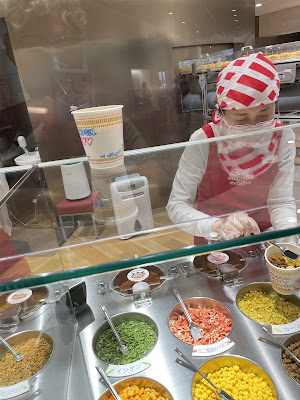April 20, 2023
I have a lot to say today because we took a day-trip to Osaka.
Cup Noodles Museum
We got an early start because we had to take three different trains to get to Ikeda, a suburb of Osaka. Ikeda is the home of the Cup Noodles Museum. We had to arrive there before 9:30 so that we would be on time for our visit to the “Chicken Ramen Factory.” It wasn’t a real factory; it was an interactive experience during which we made chicken ramen from start to finish. There were a lot of steps in this process.
The experience was fun and was designed so that everyone would succeed, no matter how little experience you have cooking. We got to work in a spotless kitchen/lab with lots of staff on hand to help.
Everyone got a number to make sure we ended up with “our” noodles. We also got aprons, as well as bandanas we could keep. Bandanas are common in Japanese restaurants and kitchens.
First we wrote our names on the packaging and drew pictures on the front. Next, we mixed our dough, kneaded it, rolled it out and ran it through some kind of pasta machine ten times.
 |
| The dough was measured with a digital caliper to make sure it wasn’t too thick. |
The two batches were put into wire-mesh holders and deep-fried — by professionals. We watched from the other side of a window, following our own personal noodles through the frying and drying stages.
We also did an activity called My Cup Noodles which involved buying an empty cup from a vending machine, decorating it, and then adding your choice of soup flavor and add-ins for a unique package of soup. I picked seafood stock, and dried peas, dried corn, dried shrimp, and something else. (It will be a surprise to me when I open it eventually.) It was a brief process, but it was interesting to watch my cup get a lid be shrink-wrapped.
 |
| Pick |
 |
| Pack |
 |
| Plastic wrap |
Last of all, we visited exhibits about the origins of Cup Noodles (right here in Ikeda, in 1958) and The Instant Ramen Tunnel, a timeline and display of every flavor ever sold.
 |
| A giant statue of the chicken mascot watched everything |
Only in Japan.
Shinsekai
Our next destination was Shinsekai, a kind of seedy neighborhood that has seen better days. Shinsekai was created in 1912 and based on New York City. There are narrow lanes and little shops.
There are garish 3-dimensional signs, and neon, and cliches.
Shinsekai is next to a neighborhood based on Paris, complete with an Eiffel Tower.
We came here to find some good kushikatsu, the skewered fried food that Shinsekai is famous for. We found a recommended place called Tengu. We knew we were at the right place because it had a red demon over the door and there was a line to get in.
Billikens
It was here that I first noticed a lot of gold Buddha-like statues in front of restaurants and shops. They had English writing on them. Some of the statues were labelled “The Billiken,” and some said “The God of Things as They Should Be.” 
I have added blue arrows to show two large Billikens
OK, this is weird. I always thought Billikens were an Alaska Native thing. You used to see carvings of them in gift shops. You probably still could. There even used to be a bar/cheap motel somewhere called The Billiken Inn. But there are so many here. Are they a Japanese thing?
I did some research later, and the answer is even weirder. They were “invented” by an art teacher in Missouri. Read more here:
Billiken: The Unofficial Mascot of Osaka
Osaka Castle
The construction of the spectacular Osaka Castle started in 1583. It was destroyed and rebuilt a several times over the years. What we see today is a reconstruction, built in 1931, and repaired in 1997.
I love this castle. It is a beautiful, balancing sheer power and delicate detail.
Dotonbori
Dotonbori is a street along the river. It is famous for food, and for its iconic signs, and cheap over-priced souvenirs (and for crowds, maybe?). We started by visiting a huge variety store called Don Quijote. It’s interesting how many stores in Japan have English names, though perhaps Don Quijote is Spanish. At any rate, many of the stores are named using the Latin alphabet.
Libby and Eric tried some of the foods here, including the Kobe beef. It was delicious and buttery, they said, but it was expensive.
 |
| This shop sells sushi-sized bites of Kobe beef |
 |
| Plastic models show the food on this restaurant’s menu |
 |
| Giant gyoza, a Billiken, and a dog cafe. The dog cafe has dogs that you can play with - reservation required. |
 |
| The legs on the crab move |
Only in Japan!
Today’s color is gold, for Osaka Castle, for golden-fried food, and for Billikens!























What a fun day!!!
ReplyDeleteBusy, WONDERFUL day!! Thanks for sharing.
ReplyDeleteAs soon as I saw the word “Billikens,” I recognized it as the nickname of the Univ of St Louis. I didn’t know what it was or the word’s origin. But as a sports fan, I knew that piece of trivia. Now clicking the link. Kate
Wonderful day to travel with you. Thanks
ReplyDelete